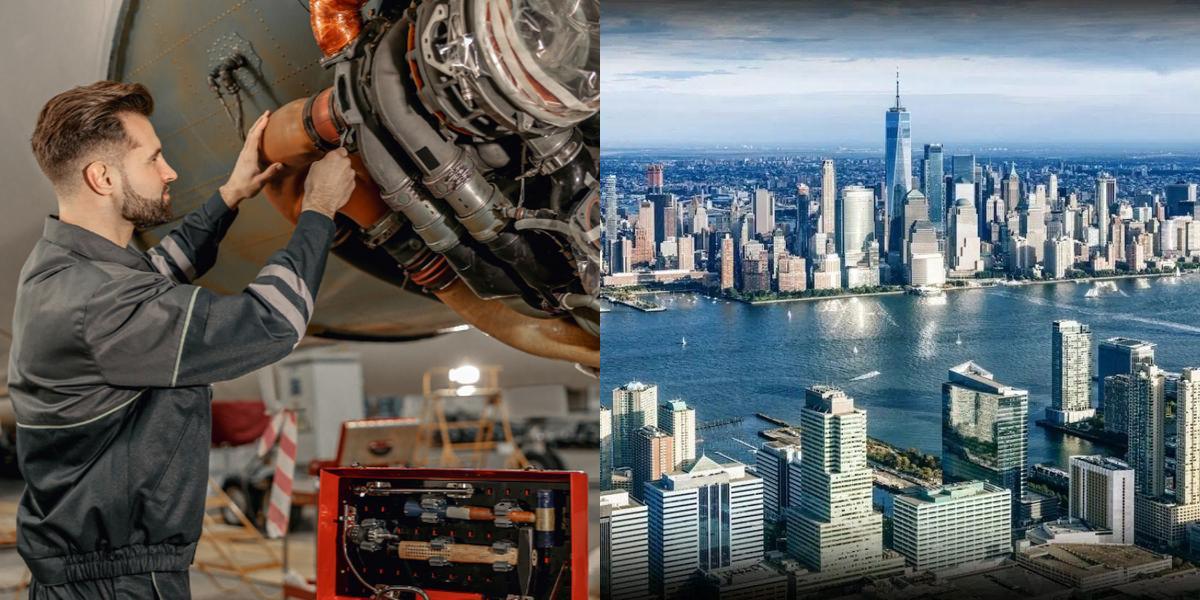How to Become an Aviation Mechanic in New Jersey

Aviation mechanics, also known as aircraft mechanics or aircraft maintenance technicians, are professionals responsible for maintaining and repairing aircraft to ensure they are safe and in optimal working condition. Their main responsibilities include conducting inspections, troubleshooting mechanical issues, repairing or replacing faulty components, and performing regular maintenance tasks.
How do I get a job as an Aviation Mechanic?
Now that you have obtained your aviation mechanic certification, the next step is to find a job in the field. Here are some steps you can take to increase your chances of landing a job as an aviation mechanic:
-
Resume and Cover Letter: Start by creating a professional resume and cover letter that highlight your education, experience, and skills. Tailor your resume to the specific job you are applying for and emphasize any relevant experience or certifications you have.
-
Networking: Networking is a valuable tool for finding job opportunities in any industry, and aviation is no exception. Join industry associations and attend aviation events and conferences to meet professionals in the field. Building relationships with industry insiders can lead to job leads and recommendations.
-
Online Job Boards: Utilize online job boards and websites that specialize in aviation jobs. Websites such as Indeed, Monster, and Avjobs are great resources for finding job openings in the aviation industry. Be sure to regularly check these websites for new job postings.
-
Company Websites: Many aviation companies, including airlines and maintenance facilities, have their own career pages on their websites. Check these websites regularly for job openings and submit your resume and cover letter directly through their online application systems.
-
Internships and Apprenticeships: Consider applying for internships or apprenticeships with aviation companies. These opportunities allow you to gain valuable experience while also making connections in the industry. Internships and apprenticeships can often lead to full-time employment opportunities.
-
Prepare for Interviews: Once you start receiving interview invitations, make sure to prepare thoroughly. Research the company and familiarize yourself with their operations and values. Practice common interview questions and be prepared to discuss your experience and skills.
-
Stay Positive and Persistent: Finding a job as an aviation mechanic can take time, and it's important to stay positive and persistent throughout the process. Keep applying to jobs, follow up on applications and interviews, and don't get discouraged by rejection. Persistence and a positive attitude can go a long way in landing your dream job.
Career Paths and Opportunities after Becoming an Aviation Mechanic
Becoming an aviation mechanic opens up a world of career opportunities within the aviation industry. Here are some of the career paths and opportunities you can explore after becoming an aviation mechanic:
-
Airlines: Many aviation mechanics find employment with commercial airlines. Airlines have their own maintenance facilities where mechanics perform routine maintenance, inspections, and repairs on aircraft. Working for an airline can provide stability and the opportunity to work on a wide variety of aircraft.
-
General Aviation: General aviation refers to all civilian flying that is not done for commercial purposes. General aviation includes private aircraft, flight training, and recreational flying. Many aviation mechanics find employment with general aviation maintenance facilities, where they work on private planes and provide maintenance services to individual aircraft owners.
-
Aircraft Manufacturers: Another career path for aviation mechanics is to work for aircraft manufacturers. Aircraft manufacturers have their own maintenance facilities where mechanics perform pre-delivery inspections, modifications, and repairs on newly manufactured aircraft. Working for an aircraft manufacturer can provide the opportunity to work on cutting-edge aircraft and technologies.
-
Maintenance and Repair Organizations (MROs): Maintenance and Repair Organizations (MROs) are independent companies that specialize in the maintenance and repair of aircraft. These companies provide services to both commercial and general aviation operators. Working for an MRO can provide exposure to a wide variety of aircraft and the opportunity to work on different types of maintenance projects.
-
Government Agencies: Aviation mechanics can also find employment with government agencies, such as the Federal Aviation Administration (FAA) or the Department of Defense. These agencies have their own maintenance facilities where mechanics perform inspections, repairs, and maintenance on government-owned aircraft.
-
Self-Employment: Some aviation mechanics choose to start their own maintenance businesses and work as independent contractors. This allows them to have more control over their work schedule and client base. However, starting your own business requires a significant amount of experience and knowledge of aviation regulations.
Final Thoughts
Becoming an aviation mechanic is a rewarding career choice for those with a passion for aircraft and a knack for hands-on work. By following the steps outlined in this guide, you can obtain your aviation mechanic certification and start your journey towards a fulfilling career in the aviation industry.
Remember to continue learning and staying up-to-date with advancements in aviation technology. The aviation industry is constantly evolving, and it is essential to stay current with new technologies and regulations to enhance your career prospects.
Whether you choose to work for an airline, a maintenance facility, or start your own business, the opportunities for aviation mechanics are vast. With the demand for air travel and aircraft maintenance expected to grow in the coming years, now is a great time to pursue a career as an aviation mechanic.
So, if you have a passion for aircraft and enjoy working with your hands, consider becoming an aviation mechanic and embark on an exciting and rewarding career in the aviation industry.
Looking for a better fit? These other articles could be more in line with your expectations if this one isn't precisely what you had in mind:

Justine Tacmo is part of the Growth team at Dreambound. He assists the organization by updating critical information so students receive the most up-to-date information for their desired trade schools. Besides, he has a passion for writing and expresses it through poetry, covering themes of life, love, and mental health, which is also his advocacy.



